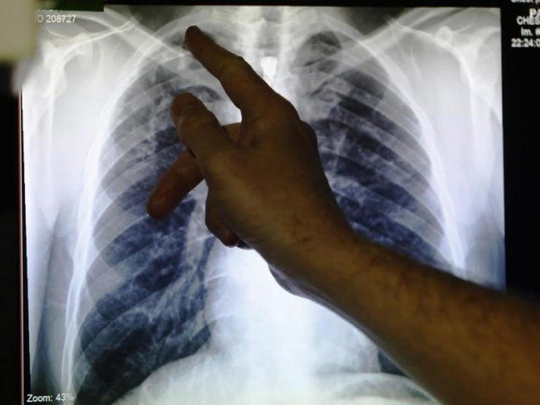
Dubai: March 24 is World Tuberculosis Day. Tuberculosis (TB) is one of the top 10 causes of death worldwide. In 2015, 10.4 million people fell ill with TB and 1.8 million died from the disease (including 0.4 million among people with HIV), according to the World Health Organisation (WHO) data.
Over 95% of TB deaths occur in low- and middle-income countries. Six countries account for 60% of the total, with India leading the count, followed by Indonesia, China, Nigeria, Pakistan and South Africa.
Medical researchers continue their work to eliminate the disease. On Friday, the BBC reported a world-first "breakthrough" in the diagnosis of tuberculosis. Researchers in Oxford and Birmingham claim they can now isolate different strains of the disease using a process called genome sequencing, which is hope to further strengthen early diagnosis, and prevention.
These are some of the key things you need to know about this disease.
1. What is TB?
Tuberculosis (TB) is a contagious disease caused by the bacteria (Mycobacterium tuberculosis) that most often affect the lungs. It spreads from person to person through microscopic droplets released into the air. This can happen when someone with the untreated, active form of tuberculosis coughs, speaks, sneezes, or spits.
2. TB is 100% curable
TB is 100 per cent curable; Early detection is key. Moreover, absolute compliance with treatment and regular follow-up are extremely important to treat the disease. TB incidence has fallen by an average of 1.5% per year since 2000, according to WHO. This needs to accelerate to a 4–5% annual decline to reach the 2020 milestones of the organisation's "End TB Strategy".
3. Mandatory TB test
In February last year, the UAE Cabinet passed a resolution on infectious and communicable diseases mandating all residents to undergo TB screening while renewing their residence visas. Experts say that early diagnosis means patients can recover much faster and reduces the spread of infection.
4. Free TB treatment for UAE residents
In March 2016, a new ministerial decree was passed stating that all UAE residents — including first degree relatives of UAE residents such as parents, spouses or offspring — will be provided treatment free of cost at any of the Ministry of Health and Prevention’s designated treatment centres. Moreover, those found with active TB or scars will be exempted from deportation and given a one-year conditional residence visa. There is good news for UAE residents.
5. TB prevalence in the UAE
Last year, prevalence of TB in the UAE was at 5 per 100,000 inhabitants, considered low compared to other countries. Dr Hassan Shurie, Consultant and Head of Technical Services at DHA’s Medical Fitness Department, explained: “In general, in the UAE, the prevalence of TB is quite low, it is roughly five cases in every 100,000 as compared to many countries where the prevalence is 20 to 30 cases per 100,000."
A tuberculosis (TB) patient takes medicine at a Directly Observed Treatment Short Course (DOTS) clinic in Mumbai. TB is a major killer in India. — AFP
6. Children with TB
In 2015, based on WHO estimates, 1 million children became ill with TB and 170 000 children died of TB (excluding children with HIV). TB is a leading killer of HIV-positive people: in 2015, 35% of HIV deaths were due to TB. Globally in 2015, an estimated 480 000 people developed multidrug-resistant TB (MDR-TB).
7. TB incidence in India, China
According to this website, India is the country with the highest TB incidence. In 2015, the World Health Organisation (WHO) TB statistics for India give an estimated incidence figure of 2.2 million cases of TB in the sub-continent out of a global incidence of 9.6 million. China registers around 900,000 new cases of tuberculosis every year and remains among the 30 countries with the highest incidence of the disease, despite a decline in cases since 2011, Chinese health authorities said on Friday. The National Health and Family Planning Commission said that by the end of 2016, 65 out of every 100,000 people were infected with TB, a figure that experts consider high despite having dropped by 14 per cent in the last six years, the China Daily reported Friday.













